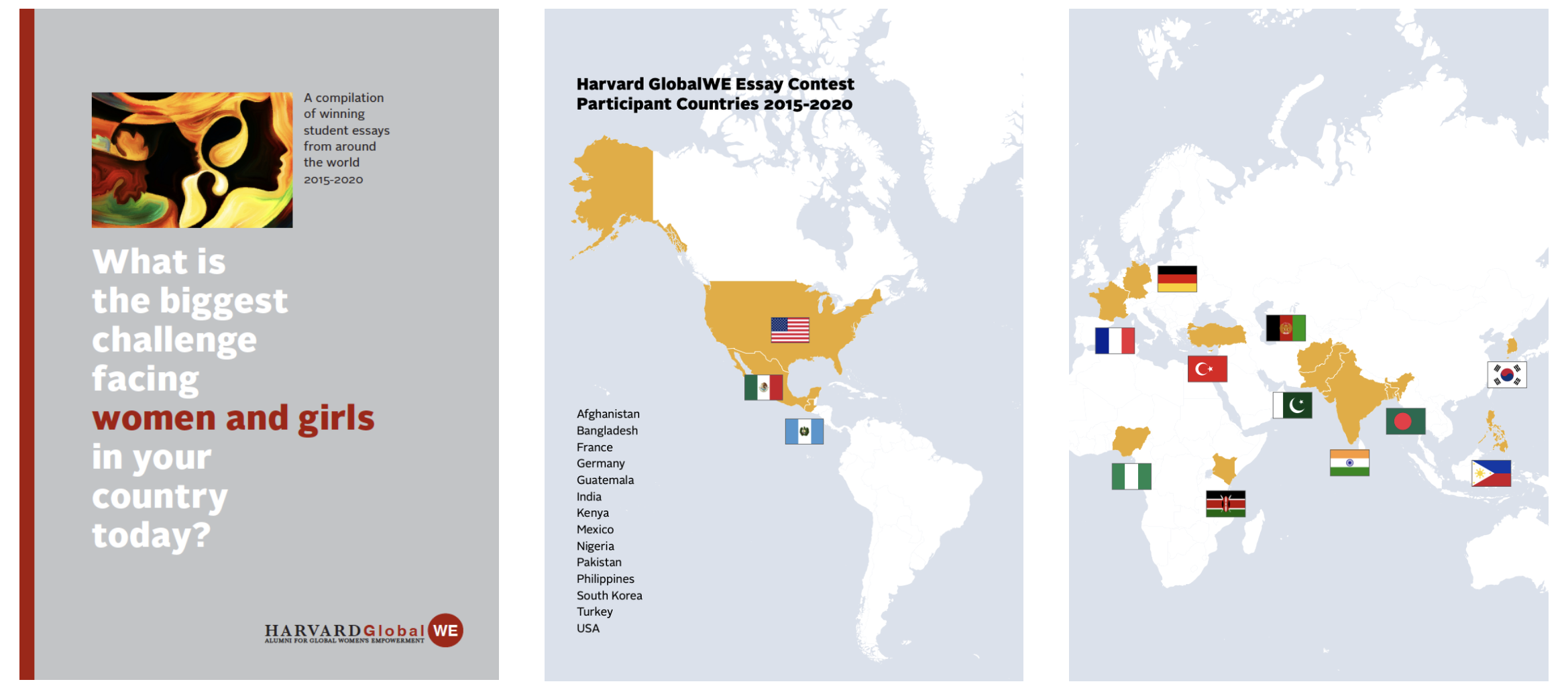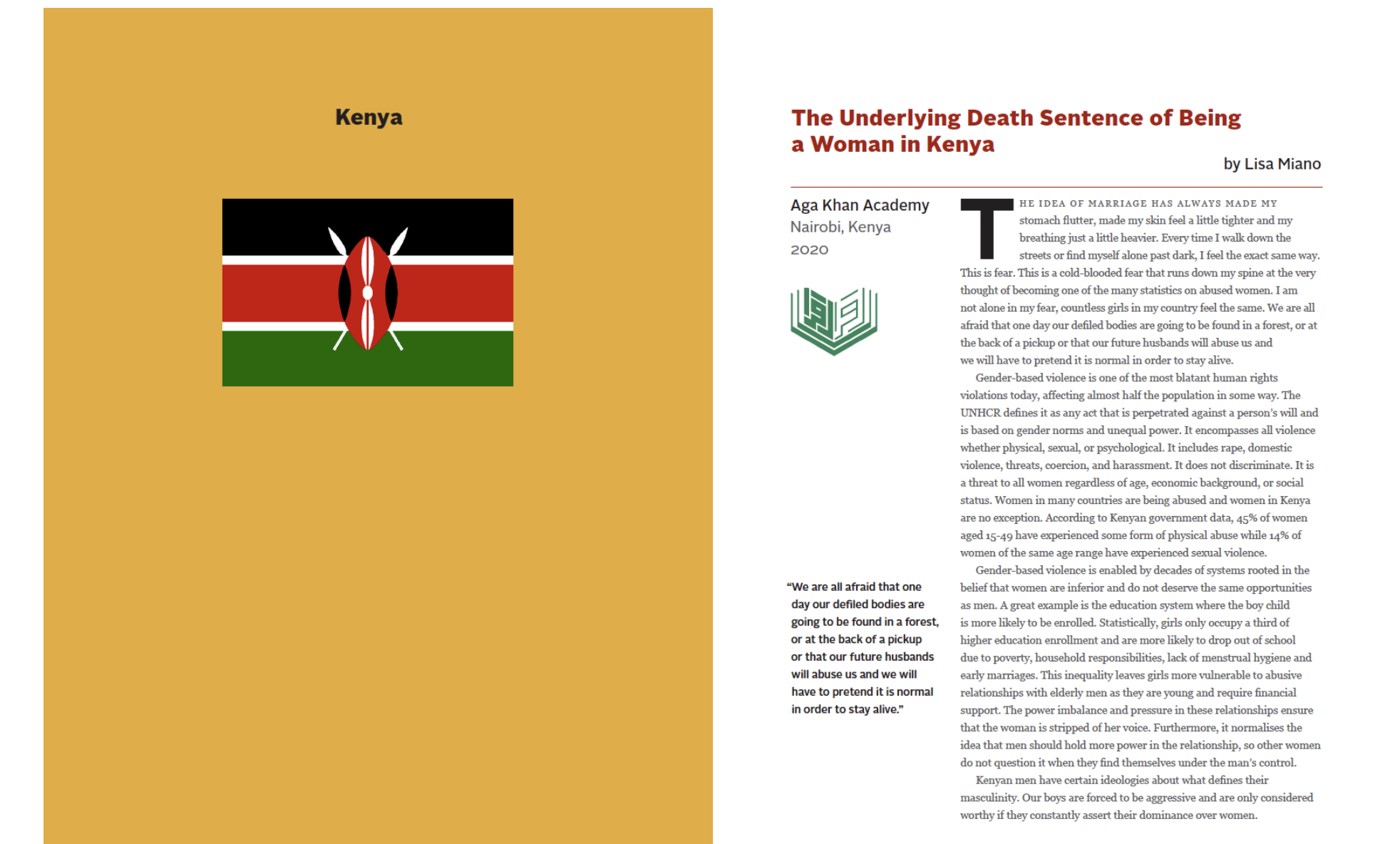Never have I ever been so fundamentally shocked by a statement from a human than when a well-educated Ghanaian man who is currently pursuing his Ph.D. told me during a discussion on gender roles that “women are nothing but birth – giving machines”.
Read MoreBorn in 1954, now a mother of four children, Ruqsana was a force to be reckoned with. Raised in the heart of her village, in a sturdy, concrete home, with a section in the middle without a roof. Not due to any natural disaster, but rather made so that she could grow a plethora of plants.
Read MoreA nation in mute.
Brightly colored signs. Approaching figures. Bold block letters and hand-drawn images embellish the diverging faces, a patchwork of all different sizes and shapes and colors. As the crowd shifts, it creates a ripple of raised fists, open lips, and faces drawn in tense determination, furrowed brows and iron gazes tilted towards the sky.
Read More“I wish she’d said something different, but patriarchy is as prevalent around the world as racism and xenophobia are. We can’t hide from it, not even here.” ― Raquel Cepeda, Bird of Paradise: How I Became Latina Pakistan is well known for harboring an awfully patriarchal culture. Girls marry at a young age, have children and are expected to be dutiful wives and remain in seclusion.
Read MoreThe hot beams of summer struck my face as I happily strolled to the train that sunny Thursday morning, wearing my new baby blue skirt with little yellow flowers to cool down from the oppressive heat. However, my glowing smile quickly faded as I caught an old man staring at my thighs. My stomach suddenly rumbled with a discomfort so sickening I wanted to throw up.
Read MoreIn this essay, I will state that girls not being accessible to education has caused them to be subjugated after marriage.
Bangladesh is a patriarchy society where the men do not only dominate but are also considered as the asset and women as the liability of the family.
Read MoreIn the paper, I analyses the convoluted mix among religious, traditional, and state ideology that confine women role in contemporary Vietnamese society. Since I am living in Bangladesh for my undergraduate, I will compare the intellectual context about gender issues in the two countries, and suggest a solution to solve the constraint for women in Vietnam.
Read MoreI wish I could have pin pointed one particular problem that was the biggest that Indian women faced, but instead I found a conglomeration of issues. Issues that manifested as a low buzz in everyday casual sexism, ranging from ‘make me a sandwich’ jokes to rigid mindsets exhibiting as underhanded comments about working after marriage or simply working.
Read MoreThe Philippines was ranked 9th globally and 1st in all of Asia in the Women’s Economic Forum’s Gender Gap Report published in 2014. The report was based on women’s participation in the economy, their educational attainment, health, and political empowerment. Despite this, Violence Against Women (VAW) is still considered by the Philippine Commission on Women to be “one of the country’s most pervasive social problems.”
Read More“Honey, can you get me a coffee?” “Mom! Where is my shirt?” “Mom come on! I need you to take me to my academy!” “Mom, what are you cooking tonight?” “Sweetie, you’re almost thirty already – when are you going to have a baby?” Even now, the roles that women are asked to play in Korean society are often rigid and oppressive. Women are asked to simultaneously fulfill the part of driver, chef…
Read MoreThe interviewer peers at the woman seated across from him and asks, “You’re a woman. Do you want this job? Don’t you want kids later on in life?” The young interviewee nervously replies, “I do want this job, but I’m also planning on getting married and raising a family.” The interviewer looks unimpressed as he scrutinizes…
Read MoreOne spring day in 2016, in a public bathroom of the bustling Gangnam area, a young woman was stabbed to death by a man she had never met before. “I did it because women have always ignored me.” Despite these chilling words, the murder was not ruled a hate crime, revealing a disheartening truth about Korean culture: for centuries, women have been considered mere subordinate objects that should serve men…
Read MoreI gazed at her from afar. Her eyes dreamy, her mind floating in her own world. I watched her fingers dancing triumphantly to different keys. The tranquil and tingling music added to her mystery. There was almost an invisible veil closing around her, separating her from me and the rest of the world. I longed to comprehend the stories she conveyed in the music. I stayed there, never advancing for fear of breaking the perfect image…
Read MoreAs a young man living in Mexico City, I form part of a demographic that enjoys unparalleled privilege. During my life, I’ll get to earn 1 dollar for every cent a female counterpart makes, I will be expected to work and follow my dreams instead of staying at home cooking and cleaning and, when I walk down the street, I won’t get catcalled or whistled at. While these are all terrible symptoms of the…
Read More“Haram, ayıp.” “I would think twice before I wear that.” “She didn’t resist to rape? She is equally guilty then.” “Am I going to use mass transit? If so, that dress I bought could wait for a little more.” Being a woman. Unfortunately this is the biggest challenge faced in my country. It is what we blame ourselves for, it is what we are blamed for, when actually it is something to be celebrated and empowered. Our culture expects lot from women; being a sister, being a mother, being a wife...
Read MoreAmong the plethora of problems which deter Pakistan from setting sail on the path of development and prosperity, perhaps the most unfortunate and regrettable one is the lack of education for women. While Pakistan has produced Malala Yousafzais and Arfa Karims, millions of Pakistani girls are deprived of the chance to go to school and tap into their potential. They are deprived of the opportunity to stand on their feet and be aware of their own rights and responsibilities…
Read MoreIn 1911, the penalty for adultery was made equal for men and women; in 1917, forced and underage marriages were declared illegitimate; and, in 1926, with the new Turkish Civil Code, a monogamous marriage in which women have a right to divorce, custody, and property was made compulsory (Türkiye’de Kadın); yet a century has passed and the headline still reads: "15-year-old girl killed by family after being raped by cousins" (15-year-old Girl)…
Read More

